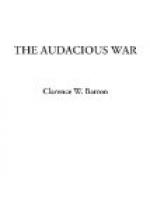The strain that was thrown upon that embassy for information, passports, transportation, etc., was something terrific. United States statutes allow this embassy only three secretaries, but it had to use eight, and the work continued until 3 A.M., and sometimes 5 A.M. There was only one relief in the situation and that was in a study of the queer characters one finds abroad, insisting that they are representative Americans. Some of the people demanding free transportation back to America declared their residence to be in Hoboken, but could not tell if Hoboken were nearer New York City than to San Francisco. It was a great temptation for some people to get out of the war zone and into America at the expense of Uncle Sam. The amount of business transacted by this embassy may be illustrated by the fact that the cable tolls alone for several months cost more than the former total expenses of the embassy.
Still another lesson from the war that America must learn is that food supplies are now not national, but international. We have seen the price of sugar in the United States jumping up and down in a commercial battle between England and Germany almost before their clash at arms.
Before the war, 80 per cent of the sugar consumed in England was produced in Germany. England, under her free trade policy, had permitted German beet sugar interests, fattened upon a government bounty, to destroy the refinery interests in the south of England. The Island gained by the trade because her refineries were turned into sugar canneries. Jams and marmalades therefrom expanded her foreign trade. Germany, however, at the outbreak of this war, proposed to cut off, or tax heavily, England’s sugar supply. Into the markets of the world went the British Treasury and in a few days the government was in command of an eighteen months’ supply of sugar for the whole of Great Britain. Down went the price of sugar in Germany, and now the government is taking measures to restore prosperity to her sugar interests by a reduction in beet-sugar plantings. The English government is selling sugar in England at a loss, as a war measure, and will not permit sugar purchases in any country where Germany sells her sugar.
Nothing but the strain of war could have induced the Bank of England to count a hundred million dollars in gold sent from New York into Canada as a part of the Bank’s metal reserve.
There is now no reason why this relation should not continue. Why should fifty or a hundred million in gold be sent across the ocean in the spring, to be returned in the fall? The world is going to be still more a unit in finance hereafter. It has taken a generation to educate the world to the right of the individual in the common fund of money, so far as money is needed to effect transfer of credits. This is the keynote in our Federal Reserve act: that business has just as much right to regulation promoting safe and smooth credits as it has to national regulation promoting safe and sound transportation.




